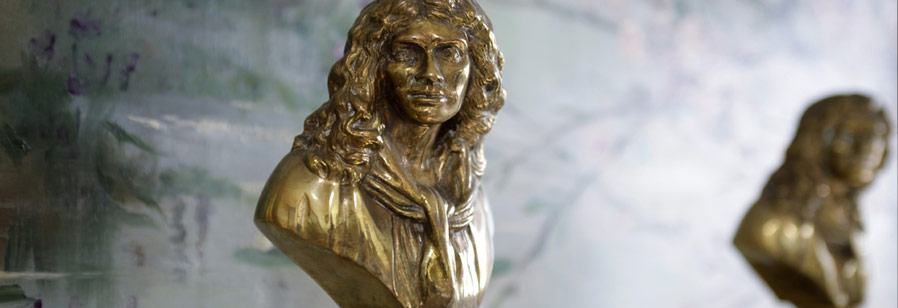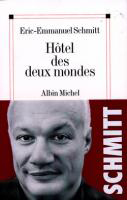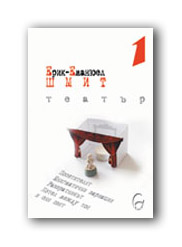Summary
"How on earth did I get here? When wll I be able to leave? Where will I go?" Every guest who gets to the Two Worlds Hotel asks the same questions. But nobody knows the answers. In this strange place, anything is possible, even miracles - the lame walk again and liars tell the truth. The enigmatic Doctor S. looks after the guests during their stay, but his silence only increases their fears.
Eric-Emmanuel Schmitt's new play after The Visitor is a metaphysical suspense drama between dream and reality, life and death, comedy and tragedy. Schmitt's play is another desperate quest as well as a variation on the notion of Meaning. In the end, Mystery remains the sole reason for hope.
Comments
« I am often asked how... »
I am often asked how the idea of this hotel between two worlds with its lift ever came to my mind. However hard I rack my brain, I cannot remember.
Where do ideas come from? Why do they besiege us? My characters are in a coma, a situation I have never experienced. But, I've seen some of my relatives and friends leave for this mysterious place. Some came back, others didn't. What strikes me most in the case of those who survived is how happy, how lively, how eager to live and to enjoy themselves they have become. They laugh themselves about the fact that they weren't very good at being alive before.
This metamorphosis made me think. Intimations of death and the discovery that our mortality is the main thread in the tapestry of life was not, as you might think, a tragedy for them, but an eye-opener: life is not to be taken for granted; it is a curious gift you enjoy better the second time it is offered you. Only those who have come back feel grateful. Might happiness have to do with thinking about death?
I've had 'marginal experiences' myself, one when I could have died and another when I should have died. Forgive me for not saying more about it. I've always refused to talk about my life. I prefer to filter it and put it into my characters's lives - in my writings, "I" is always a faked name. When I was at death's door, I was surprised, dumbfounded by the feeling that came over me: a feeling of serenity. I used to be scared by a spider, a nasty remark, an impassive face, a letter from my tax-collector (I still am!). And all of a sudden, there I was, feeling neither fear nor anxiety. I was no longer afraid, no longer anxious. I was left with a feeling of plenitude. A voice that was most likely not my own, kept telling me: "Everything is justified."
What is my play about? To let oneself go and embrace mystery. Not to fear the unknown any more and to accept what is bound to happen. Such is the bewildering journey Julien is going to make. Since the play was put on, I've been delighted to have people stop me in the street or in a restaurant. They catch my arm and whisper in my ear the following line they know by heart: "faith is like a little flame that throws light on nothing but which keeps you warm." When Julien gets to the hotel, he is a man of our time: he is pessimistic, materialistic and stressed; he drives too fast, loves too fast and thinks too fast. He has all the prejudices of today's ready-made thinking - what you might call negative convictions. This ideological burden is stifling him, preventing him from living and committing himself and it cuts him off from things and from other people. Being obliged to wait, forced to think about his destiny, compelled to meet all those people staying at the hotel, all this changes him radically. He leaves the place with a strength that is completely new to him: the strength to consent. The power of waiting…
At one time, I wanted to call my play, "The Wasting Room", but I gave up this title when I realized that nothing was ever wasted. I get asked a lot of questions about the strange Dr S. The same questions I've asked myself. And I'm not able to answer them all.
Why a doctor to organize this passage?
Because today, a doctor is the agent between death and us.
Why has the doctor several sexes?
Because the doctor is asexual.
Why the name: Dr S.?
I wanted the audience to ask themselves this question and I wanted them to find their own answer. I was given many solutions and I liked them all. 'DR S'. because 'doctoresse' (in French 'doctoresse' means a woman doctor), 'S' for 'Sphinx', 'Styx', 'Silence', 'Sign', 'Serenity', 'Science', 'Savoir' (knowledge) and 'Sagesse' (wisdom).
One evening in February 2000, Francine Bergé, the great French tragedienne, who did me the honour of playing Dr S., told me she had her own theory about the character. It was a most amazing one. She claimed that Dr S. and I (the playwright, the author) were one and the same person. We both make our characters enter and leave the stage, we have got files on every one of them, we refuse to tell what we know about them, we organize a psychodrama with real entrances and fake exits, we sadly admit that we have no power except inside the hotel (the stage) and none on earth (reality). Dr S. is like the playwright who can sometimes be a man, a woman and 'like you', Francine told me 'a messenger of the uncertain'.
I leave her the responsability for saying such beautiful things.
Baden-Baden, Germany, April 20th 2000
Eric-Emmanuel Schmitt
Reviews
La Tribune - « A metaphysical comedyScene »
An impersonal lounge. Centre stage: a lift. Two white-coated employees, both dumb, welcome newcomers and see those who are leaving to the doors. Is this a hotel? A nursing home? Following his tribute to the 'Boulevard du Crime' with Frederick last year, Schmitt's eighth play is once again deeply influenced by philosophy in the same vein as his second play, The Visitor. Has Schmitt attempted a version of Sartre's Huis-clos (No Exit)?
Far from it. For this is not Hell but a mysterious place where men and women hovering between life and death are received, while down below on earth their bodies are being sustained in hospital with drips and tubes as they lie in a state of coma. But in this lounge in the Two Worlds Hotel they (or their soul or spirit) are miraculously unharmed. With nothing to do except wait for the final result of their medical struggle, they talk over their life, their regrets, their certainties, their lies and, of course, their death.
They are in quest of hope: six characters in search of hope, fearing that the lift might take them to some terrifying, unknown world above, while anxiously waiting to be taken back down to earth, the way to recovery. Meanwhile, to kill time as well as their fears, they talk.Three men and three women, in what is nonetheless a huis-clos situation.
They are:
- an industry magnate, arrogant and egotistical, whose one concern is how to increase his wealth, a bit of a caricature;
- a former shopkeeper who has become a Hindu illusionist, an affable character with a philosophical cast of mind;
- a young sports reporter, attractive but depressive, who has just arrived after a car accident;
- a charwoman who has worked all her life and never had much luck, not even with her kids, and who knows she has nothing to expect, but she tells her story with enthusiastic humour;
- and last but not least, a beautiful young lady, physically handicapped since she was born who has never given up fighting to survive and who, in spite of her intolerable physical condition, brings a radiant touch of hope;
- finally, there is Dr S., the strange character in charge of the hotel, a mere passing agent and something of a psychologist who would sometimes like to be a bit more powerful in order to help 'the clients' that deserve it.
Schmitt lives up to the expectations we have come to have of him, making us think about life and about what we do with it and what we may find afterwards, without ever being heavy-handed. If his humour can sometimes verge on farce, it is always with great elegance. In short, a real comedy of feeling.
Annie Coppermann
Figaro Magazine - « Is our life really our own? »
Is our life really our own? Is death really the end? Is there a big book in which everything is written? And if so, by whom? By God,the Devil or Fate? Or, on the contrary, are we completely free? You can't blame Eric-Emmanuel Schmitt for asking such questions and a good many more, for they are essential, existential even.
For once, a serious French playwright is interested in something other than social reality. And his courage should be pointed out: dealing with these critical issues on stage is no easy task. Pascal never turned his hand to writing for the theatre, after all! And we should pay tribute to Schmitt for his sincerity. There's a troubling innocence about Between Worlds, which seems clearly to describe his own anxieties - anxieties about death, naturally enough, and Schmitt's main obsession, as becomes obvious after seeing a few of his plays.
This time, he has decided to pay off old scores with death. His play is a dramatic ceremony in which he tries to exorcize the old reaper. His characters are the prisoners of some shadowy limbo where they have wandered out of their bodies. Here, they are subjected to gruelling trials and forced to ask themselves fundamental questions, which, in view of the circumstances, have more to do with the mystery of death than the absurdity of life. Schmitt thus successfully renews one of the favourite themes of the last fifty years. This is a tragicomedy, lighthearted and optimistic in spite of the subject.
Philippe Tesson
Le Parisien - « Superb acting! »
In an age when philosophers and playwrights strive to share their metaphysical anxieties with their audience, we must be grateful to Schmitt with this new play for letting the small flame of hope shine through to that point of no return: the limbo between life and death. His characters are in a coma and have plenty of time to ponder their future.
Six people wait for the die to be cast, torn between resignation, revolt, fear and hope. The play starts out looking like Sartre's Huis-Clos (No Exit), but it ends more in the spirit of Carné's film, Les Visiteurs du soir.
Make no mistake, however, this play skilfully interweaves philosophical reflection with purely human reactions.
André Lafarge
Pélerin Magazine - « Between Worlds »
Eric-Emmanuel Schmitt: a writer of divine inspiration.
France Lebreton
Madame Figaro - « Eric-Emmanuel Schmitt and Rufus meet again for the second time. »
Eric-Emmanuel Schmitt and Rufus meet again for the second time. Rufus played a wonderfully ironic and serious Dr Freud in Schmitt's The Visitor. Now, Schmitt has come up with another philosophical theme that blends comedy with serious thought. We laugh as we ponder, a combination that has become Schmitt's trademark. There are breath-taking performances by Catherine Arditi, overflowing with vivacity, and Bernard Dhéran, who plays the part of the larger-than-life noble father.
An illusionist wearing a turban, played with much finesse by Rufus, is another client at this hotel. When Laura arrives, beautifully acted by Laurence Côte, she brings with her a mystical aura. She is the soul of the show: a Joan of Arc in a wheelchair struggling against illness and destiny. She and Yves Bertheloot form a moving duet.Once again, Eric-Emmanuel Schmitt tackles the questions that really matter on the subjects of love and death, and with such panache.
Marion Thébaud
Actualités Juives - « Eric-Emmanuel Schmitt, who brought us The Visitor ... »
Eric-Emmanuel Schmitt, who brought us The Visitor, has written his eighth play Between Worlds, a metaphysical suspense drama and a philosophical fable. This superb play, in many ways a comedy, is influenced by philosophy and humanism, with a quick tribute to Sartre's Huis-Clos (No Exit) - a most malicious one!
Theatre of such intelligence and sensitivity is rare these days. Its great merit is to ask essential questions about fate and luck and about the arbitrariness and unfathomable mystery of life in which there are nonetheless plenty of reasons for hope.
Make haste to see this exceptional play poised halfway between tragedy and comedy.
Michèle Lévy-Thaieb
Publications
- In German, published by Libelle Verlag, in school edition in French by Klett Verlagg
- In English, published by Methuen
- In Bulgarian, published by Lege Artis
- In Korean language, published by Balgunsesang Publishing Co
- In Persian language
Stage Productions
- Bulgaria ????? ????? ???? ? ???? ????
Translation by Snéjina Roussinova-Zdravkova
Plovdiv, City Theater, 01/02
Varna, City Theater, 2001
Yambol, City Theater, 2001
Pernik, City Theater, 2002
Sofia, City Theater, 2003 - French-speaking Belgium
Brussels, Theatre Royal des Galeries, 02/03 - French-speaking Canada
Quebec, Theater le Carré Magique, 2006/07 - Czesh Republic: Hotel mezi dvema Svety
Prague, Th F.S. Saldy Liberec, 06-07 - Denmark
Herning, Team Teatret, 2008, 2009 - Estonia
Rakvere, City Theater, 2001 - Finland
Lahti, City theatre, 02
Imatra, City theatre, 04
Kokkola, City theatre, 07
Kotlan Kaupunginteatteri, Jan 2008 - France
Paris, Atelier Théâtre Actuel, 00/01 - Germany: Hotel zu den zwei Welten
Translation: Annette and Paul Bäcker
Baden Baden, City Theater, 2000
Bautzen, Deutsch-Sorbisches Volktheater
Bielefeld, Mobiles Theater
Burberg, Theaterwerkstatt Kempten, 2005
Chemnitz,Theater, 2009/2010
Frankfurt, Fritz Remond Theater
Hamburg, Altonaer Theater
Köln, Theater der Keller, 2002
Landesbühnen Sachsen, 04/05
Nordtour, tour 05/06/07
Osnabrück, Städtische Bühne, 00/01
Parchim, Mecklenburgisches Landestheater, 2009/2010
Pausa, Evanglische Spielgemeinde, 2005
Radebeul, Landesbühnen Sachsen, 2005
Regensburg, Stadttheater, 2005
Speyer, Theatergruppe Prisma, 2005
Tübingen, Landestheater, 2005
Würzburg, Mainfrankenstheater
Würzburg, Teater Ensemble, 2009 - Greece
Athênes, Amfitheater, 06-07 - Hungary
Budapest, Kamaraszinhaz, 2001 - Italy: Hotel dei due mondi
Translation : Miro Mayer Silvera
Milano, Theatre Franco Parenti, 00/01
national tour 05/06 - Poland
Translation Katarzyna Skawina
Warsaw, Scena Prezentacje, 2000-2007 - Portugal
Lisboa, Teatro Nacional D. Maria II, 06 - Russia: ????? ???? ?????
Translation Hélène and André Naoumoff
Moscow, Th Soglasie - Switzerland
Geneva, Théâtre Pitoeff, 2004 - United-Kingdom
Londres, Union Theatre, 2006 - USA
Translation John Clifford
New York, Stages of Learning, 2005
Californian Repertory, Edison Theatre, 2005






